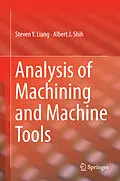This book delivers the fundamental science and mechanics of machining and machine tools by presenting systematic and quantitative knowledge in the form of process mechanics and physics. It gives readers a solid command of machining science and engineering, and familiarizes them with the geometry and functionality requirements of creating parts and components in today's markets. The authors address traditional machining topics, such as:
- single and multiple point cutting processes
- grinding
- components
- accuracy and metrology
- shear stress in cutting
- cutting temperature and analysis
- chatter
- electrical discharge machining
- electrochemical machining
- laser and electron beam machining
Autorentext
Steven Y. Liang is Morris M. Bryan, Jr. Professor in Mechanical Engineering for Advanced Manufacturing Systems at Georgia Institute of Technology, USA.
Albert J. Shih is Professor in Mechanical Engineering, Biomedical Engineering, and Integrative Systems + Design (ISD) at the University of Michigan, USA. He is the Associate Chair of ISD and Director of the Global Automotive and Manufacturing Engineering Program.
Klappentext
This book provides readers with the fundamental, analytical, and quantitative knowledge of machining process planning and optimization based on advanced and practical understanding of machinery, mechanics, accuracy, dynamics, monitoring techniques, and control strategies that they need to understanding machining and machine tools. It is written for first-year graduate students in mechanical engineering, and is also appropriate for use as a reference book by practicing engineers. It covers topics such as single and multiple point cutting processes; grinding processes; machine tool components, accuracy, and metrology; shear stress in cutting, cutting temperature and thermal analysis, and machine tool chatter. The second section of the book is devoted to "Non-Traditional Machining," where readers can find chapters on electrical discharge machining, electrochemical machining, laser and electron beam machining, and biomedical machining. Examples of realistic problems that engineers are likely to face in the field are included, along with solutions and explanations that foster a didactic learning experience.
Inhalt
Introduction.- Single Point Cutting Processes.- Multiple Point Cutting Processes.- Grinding Processes.- Machine Tool Components.- Machine Tool Accuracy and Metrology.- Mechanics of Machining.- Shear Stress in Cutting.- Cutting Temperature and Thermal Analysis.- Machine Tool Chatter.- Electrical Discharge Machining.- Electrochemical Machining, Chemical Machining and Chemical Mechanical Polishing Processes.- Laser and Electron Beam Machining.- Biomedical Machining.
